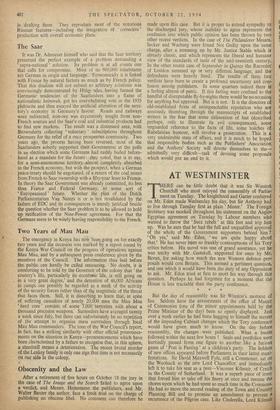The Saar
It was Dr. Adenauer himself who said that the Saar territory presented the perfect example of a problem demanding a supra-national' solution. Its problem is at all events one that calls for compromise. Most of its 900,000 inhabitants are German in origin and language. Economically it is linked with France by natural factors as much as by French policy. That this dualism will not submit to arbitrary solutions was convincingly demonstrated by Hitler who, having fanned the Germanic tendencies of the Saarlanders into a flame of nationalistic heimweh, got his overwhelming vote in the 1935 plebiscite and then essayed the artificial alteration of the terri- tory's economy in Germany's favour. Roads and railways were redirected, iron-ore was expensively sought from non- French sources and the Saar's coal and industrial products had to find new markets. The result was a distressed area, with Brownshirts collecting `voluntary' subscriptions throughout Germany for the relief of a once prosperous community. Two years ago, the process having been reversed, most of the Saarlanders soberly supported their Government at the polls in an election which some Germans had rashly hailed before- hand as a mandate for the future: they voted, that is to say, for a semi-autonomous territory ..almost completely absorbed in the French economy, but with the prospect, when a German peace-treaty should be negotiated, of a return of the coal mines from French to Saar ownership with a fifty-year lease to France. In theory the Saar Government was already committed, no less than France and Federal Germany, to some sort of `Europeanised' future. Whether the plan of the Dutch Parliamentarian Van Naters is or is not invalidated by the failure of EDC and its consequences is merely juridical beside the question whether the Saar problem is to be allowed to hold up ratification of the Nine-Power agreement. For that the Germans seem to be wisely leaving responsibility to the French.


































 Previous page
Previous page